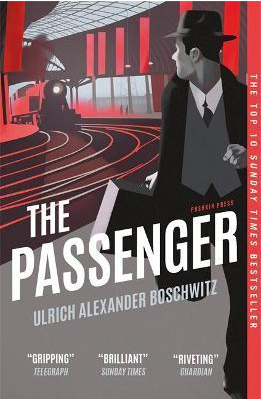
In 2015, Peter Graf, the German editor of The Passenger, read Boschwitz’s manuscript for the first time. The passenger was written in 1939, right after the November pogroms described in the novel; its English translation came out the same year in the UK. The US edition followed in 1940. Given the status of the writer, a German Jew who fled Nazi Germany in 1935, and the nature of the story, it never stood a chance of being published in Germany at the time. But post-war Germany was equally reluctant to publish the novel, even though Heinrich Böll was one of its most enthusiastic supporters. It took many decades more until Peter Graf decided to edit and publish the book. The English retranslation followed and finally The Passenger became a publishing success. During his lifetime, Boschwitz published another novel. In a Swedish translation, if I’m not mistaken. His third and final manuscript was lost together with the author. In 1942, then only aged 27, Boschwitz was on a ship back from Australia to the UK when they were hit by a German U-Boot.
The Passenger is one of the earliest German books about pre-war Germany and the November pogroms. Boschwitz who was Jewish lived in the UK at the time. He’d fled Germany in 1935 and first went to Paris. Elements of his story and the story of his family are described in the book. The pogroms were a huge shock for him. The Jews who were still in Germany in 1938 were sent to concentration camps, their property was confiscated. Within a few days they lost everything. Many tried to flee but the surrounding European countries were less than welcoming.
Otto Silbermann, the main protagonist of The Passenger, is one of those Jews who lose their company and wealth, and almost get arrested. Panicked, he flees to the train station and boards a train. The first chapters show him chasing an associate who conducts a last transaction for him. The man who isn’t Jewish, cheats him out of most of his fortune, but Silbermann is still left with 40,000 mark, an equivalent of 170,000 Euro. Decidedly enough to start a new life somewhere else. So, purely based on the circumstances, things do not look catastrophic for Silbermann. He saved his life and a small fortune. Moreover, his Arian wife can stay with her brother and his son is safely in Paris. All Silbermann must do is cross the border into Switzerland or Belgium. But while the circumstances aren’t totally against him, Silbermann is his own worst enemy. He waited too long, thinking he wouldn’t have to share the fate of all the other Jews. One gets the impression he doesn’t really see himself as Jewish because he doesn’t look Jewish and isn’t religious. To assume there’s some kind of rationality, albeit a warped one, behind the persecutions, is his biggest error. Like most totalitarian regimes, Nazi Germany has no real reason for its actions; they are purely based on irrational pretexts and scapegoating. Silbermann lived with a false sense of security for too long and once it becomes apparent that he is in danger too, the shock is so immense that he isn’t capable of clear thinking. What the reader witnesses from that moment on, is one failure and one wrong decision after the other.
I’ve read a whole series of WWII books for this GLM (due to personal reasons I couldn’t review them) and this was by far the toughest of them all. It’s so claustrophobic. The atmosphere of rising fanaticism, the way everything closes in on Silbermann is depressing. And the role ordinary people played to support this madness is mindboggling. Silbermann meets a few good Germans, but the vast majority is either actively persecuting Jews, supporting the persecutors, or cowardly looking the other way.
One of the most crucial moments in the book is an encounter between Silbermann and another Jew who is easily recognizable as Jewish. He asks Silbermann for help, and just like some of the Germans Silbermann asked himself, he denies it because he’s scared. This act of cowardice robs him of his last precious belonging – his self-esteem. Until that moment he thought of himself as very different, now, suddenly, he knows he’s not.
The Passenger is an amazing document of a specific moment in Germany history. And it’s an amazing portrait of a very flawed man. I was wondering, why Boschwitz chose Silbermann as his protagonist and couldn’t help but wonder whether he wanted to say, that especially the atypical, irreligious Jews who stayed in Germany, unconsciously supported the rising madness in thinking they would be exempt. Or maybe he just wanted to say that it is human nature to go the way of least resistance.
I know that I didn’t do this book justice and so I’m glad several other people who participated in the readalong wrote more eloquent reviews.
I’ll be collecting them here:
I’m taking this opportunity to apologize if I haven’t been very active this year and not visited and commented on your blog posts. Persoanl circumstances sadly made it impossible.
